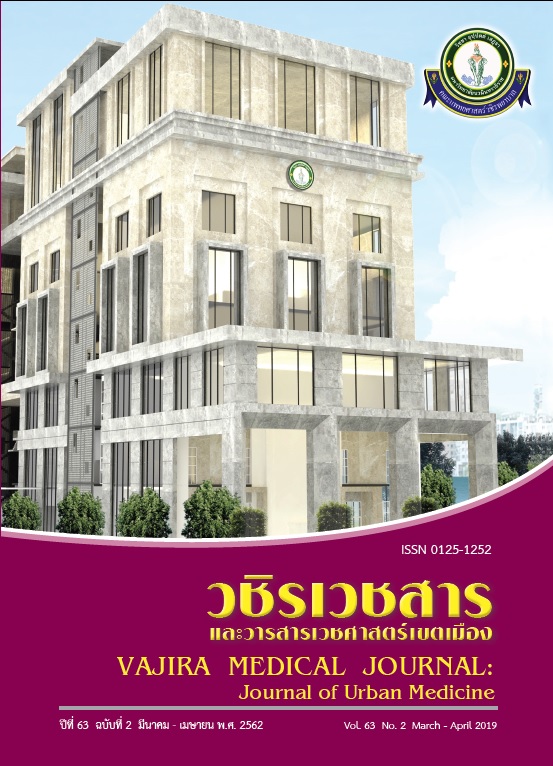Perceived Impacts of Pre-Practice Simulation-Based Learning on Clinical Experiences of Nursing Students in Primary Medical Care Practicum
Main Article Content
Abstract
Objective: To describe perceived impacts of pre-practice simulation-based learning on clinical experiences in primary medical care practicum
Methods: This was a descriptive study. A total sample of 174 fourth-year nursing students were asked to rate the impacts of simulation-based learning on their clinical experiences. The instrument was developed by the researchers using exploratory factor analysis and consisted of five aspects of the impacts. The internal consistency of the instrument by Cronbach’s alpha was 0.96.
Results: The impacts of simulation-based learning on clinical experiences were rated as high by nursing students in the following areas: learning ( = 4.37, SD = 0.52), preclinical self-preparation (
= 4.32, SD = 0.50), effectiveness of differential diagnosis (
= 4.03, SD = 0.57), and prioritisation, delegation and management (
= 4.17, SD = 0.49). However, clinical familiarisation and confidence was rated as moderate (
= 3.97, SD = 0.67).
Conclusion: As perceived by the students, simulation-based learning before clinical practice had high impact on nursing students’ learning, preclinical self-preparation, differential diagnosis, and prioritisation, delegation and care management. However, it had moderate impact on clinical familiarization and confidence.
Downloads
Article Details
References
2. Praboromarajchanok Institute for Health Workforce Development. Evaluation of clinical practice competencies using OSCE. Yutarin Publisher Limited. Nonthaburi, Thailand; 2012. p. 1-2.
3. Praboromarajchanok Institute for Health Workforce Development. Evaluation of clinical practice competencies using OSCE volume 2. Yutarin publisher Limited. Nonthaburi, Thailand; 2013. p. 1-3.
4. Ratanawimol K, Keawurai W, Hingkanont P, Teaching-learning model development to promote happy learning for nursing students using standardized patients and trusting group conversation. Journal of Nursing and Health 2015;9(3):179-191.
5. Sivaarmornrat, S. Efftect of simulation-based learning on teamwork of Pathom 5 students, Wat Leab Bumiung, School, Bang Sue, Bangkok,[Master Thesis]. Srinakarindrawirot University; 2009. p. 39.
6. Sinduchai S, Ubolwan K, Boonsilp S. Effect of simulation-based learning on knowledge, satisfaction, and self-confidence of fourth-year nursing students during professional nursing internship course, Ramathibodi Nursing Journal 2017; 23(1): 113-27.
7. Sinduchai S. Ubolwan K. Boonsilp S. Simulation-based learning: An application in teaching and learning. The Journal of The Royal Thai Army Nurses 2017;1 (1): 29-30.
8. Suwankeeree W. Simulation-based learning for nursing students. Journal of Nursing Science, Chulalongkorn University 2016; 28(2):1-11.
9. Wicharn Phanich.Transformative Learning. Bankok: S.R Printing Mass Product Limited Company; 2015. P.26-35


